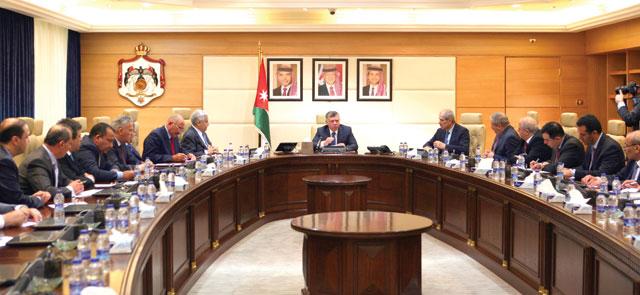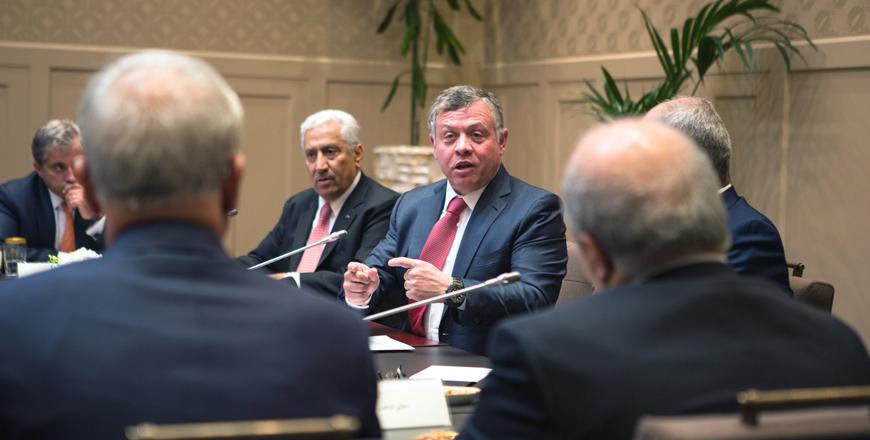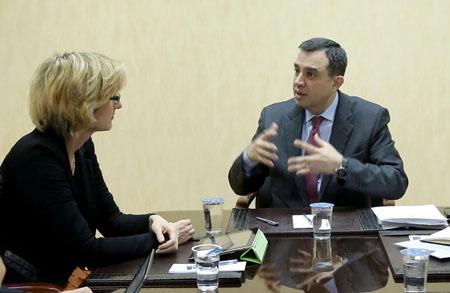You are here
King urges ministers to go to the field, speak to citizens
By JT - Mar 08,2015 - Last updated at Mar 08,2015

AMMAN — His Majesty King Abdullah on Sunday stressed the need to continue enhancing the performance of public institutions and programmes to deliver better services to citizens on the ground, in a way that meets their aspirations.
Chairing part of a Cabinet meeting, King Abdullah was briefed on government projects and programmes, and said that what matters is how to deliver these programmes to Jordanians to ensure that they feel their impact as soon as possible.
The King also noted that citizens always hope to receive better services from the government, especially at departments that receives the public daily, according to a Royal Court statement.
Ministers and officials "should leave their offices and go to the field", His Majesty said, reiterating the importance of establishing connections with citizens in their places of residence as part of government policies.
He also directed the Cabinet to continue preparing the electronic government programme which contributes to meeting the needs of citizens, business institutions and the private sector to reach a better level of services.
“There are challenges before us, and there are programmes and plans we are committed to that will have a positive impact in 2015,” the King said.
He also stressed that the success of various programmes and projects, and achieving the public interest depends mainly on enhancing the partnership among the three authorities and relevant stakeholders.
The government’s coordination with Parliament is very important, especially when it comes to public programmes targeting citizens, the King noted.
Discussions at the meeting also focused on the need to draw up a comprehensive, strategic plan to develop education and build the capacities of human resources in a way that produces qualitative education outcomes.
Talks also addressed local development projects and the importance of the government taking necessary measures to guarantee the success of the decentralisation project which will in turn increase the pace of achievements in various sectors.
Moreover, the session addressed the desired results from implementing mega-projects such as the Red Sea-Dead Sea Water Conveyance Project (Red-Dead) and the development of the Aqaba Special Economic Zone Authority, which are expected to meet growing local needs.
Issues discussed at the meeting included the growing importance of implementing renewable energy projects and the national strategy to combat extremism.
Highlighting the issues that his team will handle this year, Prime Minister Abdullah Ensour said the government will mainly focus on political reform, in cooperation with the legislative authority.
The government has already submitted the draft political parties law to the Lower House, Ensour noted.
He added that the government will present the draft laws on decentralisation and municipalities to the Lower House this week.
These three bills have been finalised to be reviewed by lawmakers during Parliament’s ordinary session, while the government will submit the draft elections law to the House in the summer, according to the premier.
Moreover, he said combating radicalisation and ensuring compliance with the principles of Islam and its tenets of tolerance is the goal of the Kingdom, led by a Hashemite Monarch.
In order to fulfil this goal, it is important to review school and university curricula, the Awqaf Ministry’s message, and the activities of other parties engaged in promoting Islam to confront terrorism and its dangers and to highlight the true image of Islam, the premier added.
The role of the media will also be reviewed in order to have state media outlets that serve the goals of the country as a whole, not a government media that receives its directives from the government, Ensour noted.
In terms of mega-projects, Ensour mentioned the Red-Dead project, which will provide Jordanians with 100 million cubic metres of water annually during its first phase — the same amount provided by the Disi water project.
The premier also highlighted the liquefied petroleum and natural gas projects in Aqaba, pointing out that some have been completed while others will be finished in May. This is in addition to other traditional and renewable energy projects, he added.
At the meeting, Planning Minister Imad Fakhoury gave a detailed presentation on the country’s 2025 economic vision, dubbed “Jordan 2025”.
It will mainly focus on strengthening the rule of law and boosting equality, increasing partnership in policy making, achieving financial sustainability and empowering institutions, Fakhoury said.
He noted that that the blueprint is aimed at securing social welfare and basic services for all citizens, and this way it can bridge the gap among governorates and engage Jordanians in the development process.
A unit to follow up on government plans has been set up at the Cabinet to oversee the implementation of the measures and proposals detailed in “Jordan 2025” and its executive programmes, he said.
The public and private sectors will work closely to implement the blueprint’s visions and initiatives through development programmes over three to four years, with the projects allocated for each year and the party that will undertake their implementation outlined, along with their costs and performance indicators, according to Fakhoury.
The blueprint will be launched during the World Economic Forum at the Dead Sea in May, he added.
With regards to private-public sector partnerships, Deputy Prime Minister and Education Minister Mohammad Thneibat said it is important to have a partnership committee to regulate and unify the work of human resources institutions.
Water Minister Hazem Nasser, Transport Minister Lina Shbeeb and ICT Minister Majd Shweikeh also spoke at the meeting, highlighting sector services.
Nasser highlighted water projects, including the Red-Dead, a project to provide the northern governorates with water from Lake Tiberias, the Hasa-Shidiyeh project to meet the needs of central governorates, and the Mujib Dam water conveyance project to help end the problem of water shortage in Karak.
Highlighting transport solutions being implemented, Shbeeb cited the Bus Rapid Transit project (BRT) in the capital, the Amman-Zarqa BRT and the Aqaba-Amman railway project.
Shweikeh said the ICT Ministry will work to raise awareness on e-government services, totalling 87, paying special attention to education, health and e-payment services this year.
Royal Court Chief Fayez Tarawneh and King’s Office Director Jafar Hassan attended the meeting.
Related Articles
AMMAN — The Water Ministry on Tuesday will publish a call for tenders in local and international newspapers for the implementation of the fi
AMMAN — His Majesty King Abdullah on Sunday stressed the need for following up on the outcome of the World Economic Forum (WEF), which the K
Planning Minister Imad Fakhoury on Sunday said donor countries and friendly nations are greatly needed to help Jordan maintain its development achievements.

















